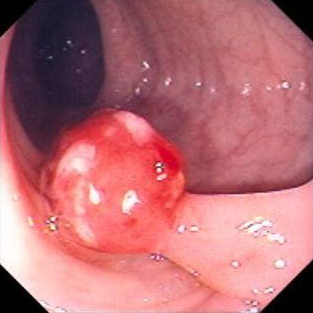Screening
What do screening tests look for?

Colon Polyp
- Polyps are common and increase with age. However, not all polyps will develop into cancer.
- Colorectal cancer (CRC) usually develops slowly over years, usually with little or no symptoms in the early stages.
- Almost all colorectal cancers develop from a polyp that grows inside the lining of the colon or rectum.
- If a close family member had pre-cancerous polyps or colorectal cancer, you may need to be screened earlier.
When does colorectal cancer screening begin?
The United States Preventative Services Task Force recommends screening between the ages of 45-75, if you are average risk. The decision to be screened after age 75 should be made on an individual basis. If you are older than 75, talk to your doctor to determine if you should be screened.
There is growing evidence which shows Young Adult Onset Colorectal Cancer (EOCRC) is rapidly increasing. Individuals age 18-40 years of age are in this category. In order to appropriately determine a persons’ risk and to bring awareness about family history and symptoms associated with colorectal cancer, the Colorectal Cancer Prevention Network believes the discussion about risk should begin, at minimum, at age 18.
An informed discussion with your doctor about symptoms, risk and family history should determine when you should be screened and how often. We recommend these conversations should occur annually as factors can change and may impact your screening age. If you are having symptoms, don’t wait! Talk to your doctor.
There are options available to you for colorectal cancer screening if you are average risk, meaning you have no family history of colorectal cancer or pre-cancerous polyps and have no risk factors. You would qualify for stool-based tests and tests that can see inside the colon (direct visualization tests). It is important to know that a positive stool-based test or CT colonography requires a colonoscopy to determine the source of the abnormal findings.
To read more on colorectal cancer screening recommendations, visit the American Cancer Society.
Screening test options for colorectal cancer
Colonoscopy and Fecal Immunochemical Test (FIT) are typically the most commonly offered screenings for colorectal cancer.
Colonoscopy
Appropriate for ALL Patient Risk Levels
Advantages: |
Disadvantages: |
|
|

Steve Harvey shared his experience with his colonoscopy. Click here to watch the video.
Visit our resource page to see the CCPN screening program clear liquid diet handout.
Fecal Immunochemical Test (FIT) and FIT-DNA
For Average Risk Patients Only
These stool-based tests only detect human hemoglobin and are not affected by blood in the upper digestive tract.
Advantages: |
Disadvantages: |
|
|
Visit the United States Preventative Services Task Force to learn more about the evidence on the effectiveness of each screening test, as well as the strengths, limitations and unique considerations for the various screening tests.

Answer a couple questions to see which screening test you need to stay healthy. MyHealthfinder gives you personalized recommendations for screenings, vaccines, and other preventive services.